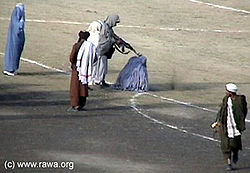Originally published in the Age written by Pamela Bone:
November 30, 2006
A MEETING of Muslim feminists from across the world in New York last week made a brief paragraph in The Australian, and in no other newspaper that I saw. It should have made front pages, being at least as important as the Group of 20 or Asia-Pacific Economic Co-operation meetings, which had as wide a coverage as sound editorial judgment demanded.
The reason I make such a claim is this: if Islam is to be reformed, and the world consequently made safer and happier for all, it is women who will do it. Yes, there are male Muslim reformers, but in general most Muslim men do not see a feminist interpretation of Islam as in their interest. Why should they? Western men didn’t see last century’s women’s liberation movement as in theirs. It had to be driven by women because the status quo advantaged men.
The meeting, of more than 100 female Muslim religious leaders, human rights activists and scholars, vowed to form an international shura council of Muslim women. “This is a historical and critical event in the history of Islam,” says Daisy Khan, director of the American Society for Muslim Advancement.
A shura council is an advisory body that interprets Islamic law for the political and religious leaders in its region of authority. The women’s council aims to overcome two stereotypes: that Muslims are terrorists and that Islam oppresses women. Leave aside the question of why anyone would put the words Muslim and terrorist together. Most Muslims are not terrorists; the point has been made a thousand times. As to whether Islam oppresses women, there is no Islamic society in which women are free. The question is whether it has to be this way.
The Koran seems fairly clear about women’s subordinate status, but then so is the Christian Bible. If Christian women have been able to argue, more or less successfully, that the misogynistic passages in the Bible are merely a reflection of the era in which they were written and have no relevance to today, there should be no reason Muslim women can’t do the same.
And why is it important that Muslim women be liberated? Well, if women’s freedom from honour killings, forced marriages and stoning for adultery were not reason enough, consider that any country in which women are badly oppressed is an economically and socially backward country, and that such conditions provide fertile ground in which resentments against the West can grow. As the 2002 UN Arab Human Development Report noted, a large part of the reason so many Arab countries are economic basket cases is the oppression of women.
One need only read the ravings of Sayyid Qutb, the Egyptian philosopher who provided the principal inspiration for al-Qa’ida, or the directions of the September 11 attacker Mohammed Atta that no woman was to touch his body, to see that political Islam has a deeply ingrained hatred of women. To a significant degree, the control of women is what the war on terrorism is about.
Some women from Muslim backgrounds believe that Islam and women’s rights are antithetical. Maryam Namazie, a British-based human rights activist, said recently: “Debating the issue of women’s rights in an Islamic context is a prescription for inaction and passivity, in the face of the oppression of millions of women struggling and resisting in Britain, the Middle East and elsewhere. Anywhere they (Islamists) have power, to be a woman is a crime.”
Namazie is of the Left. She is the director of the Worker-Communist Party of Iran’s International Relations Committee and has been named British secularist of the year. But in general, she notes, the Left, the traditional defender of human rights, is silent about the oppression of Muslim women. The reasons are that political Islam is seen as anti-imperialist, racism is these days much worse than sexism and minorities are automatically to be supported. (Some minority; Islamism is the strongest and fastest-growing ideology in the world.) Change must come from within, say the good liberals. Strangely, no one said that about South Africa’s apartheid system.
Today it is the Right that has latched on to women’s rights. John Howard was an unlikely feminist until various sheiks began expounding their theories about women’s role in society. It was only when Osama bin Laden became a threat that George W. Bush started talking about the freedom of Afghan women. No one cared about the Taliban when all they were doing was oppressing the female half of the population.
Given that a half-billion Muslim women are not going to abandon their faith, the only way they can be liberated is for Islam and women’s rights to be reconciled. That is why all power and support – and maximum publicity – should be given to Muslim women reformers.
We have today a war on terror and a (fairly half-hearted) war on poverty. It took the threat of global instability to convince some world leaders the present rich-poor divide is unsustainable. It is time it is recognised that there also needs to be a war to promote women’s rights because poverty, the oppression of women and the rise of religious extremism go together.
Western leaders should be pouring billions of dollars into the education and empowerment of women around the world. If John Howard really cares about the rights of women, he should increase Australia’s meagre overseas aid budget and direct it into health and education programs for girls who will then grow up to have healthier, better educated and fewer children.
If Western governments can’t manage to support women out of compassion, they should do so out of self-interest.


Recent Comments